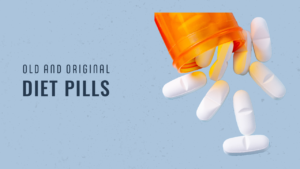The pursuit of weight loss has led many individuals to search for quick and easy solutions. One such solution that gained popularity in the past is the use of ephedra diet pills. These pills, derived from the plant ephedra sinica, were believed to have the potential to boost energy and promote weight loss. However, concerns about their safety and efficacy have prompted regulatory actions in many countries. In this article, we will provide a thorough review of ephedra diet pills, examining their effects on weight loss, potential dangers, and legal status.

A Brief History
Ephedra sinica, commonly known as ma huang, is a plant native to Asia and has been used in traditional Chinese medicine for thousands of years. (1) The major active compound in ephedra is ephedrine, which has been found to impact various bodily processes, including metabolism and fat burning.
The use of ephedra for weight loss dates back to the late 19th century. During this time, the first diet pills containing thyroid extract, which can increase metabolic rate, were introduced. However, these early diet pills had serious side effects, including abnormal heartbeats, increased heart rate, chest pains, and even death. Despite these risks, ephedra-based weight loss products remained available until the 1960s.
In the 1930s, a new weight loss medication called dinitrophenol gained popularity. It was shown to have a thermogenic effect on the body, but it also caused severe side effects such as hyperthermia, rashes, and eye cataracts. As a result, the use of dinitrophenol was halted in the United States.
By the mid-1950s, amphetamines became the drug of choice for weight loss. They were initially given to soldiers during World War II to keep them alert, and one of the side effects was appetite suppression. However, the risks of abuse and adverse neurological and psychological effects outweighed the benefits, leading to a decline in their use.
The Rise and Fall of Ephedra Diet Pills
In the 1970s, ephedrine, a major component of ephedra, gained attention as a potential weight loss aid. Initially used to treat asthma, it was later prescribed for weight loss due to its appetite suppressing effects. In 1994, the Dietary Supplement Health and Education Act classified ephedra as an herb that did not require FDA approval, leading to a significant increase in its use for weight loss. However, adverse reactions to ephedra, including cardiovascular and neurological problems, prompted the FDA to declare ephedra as an unsafe substance.
Phenylpropanolamine, a chemical derived from ephedra, also became popular as an appetite suppressant. However, it was discontinued when reports of hemorrhagic stroke and increased hypertension surfaced.
Another weight loss medication, fenfluramine, gained approval in 1973 and reached its peak of popularity in 1992 when it was combined with phentermine to create the fen-phen medication. However, the use of fenfluramine was associated with serious heart-related adverse effects, leading to its removal from the market in 1997.
In the 21st century, the market for diet pills evolved to include herbal formulations. One such medication is Orlistat, sold as Xenical and Alli. Orlistat reduces the absorption of dietary fat by the digestive tract and is used in conjunction with a reduced-calorie diet.
Efficacy for Weight Loss
Numerous studies have examined the effects of ephedra and ephedrine on weight loss. These studies have shown that ephedrine, the primary active compound in ephedra, can increase resting metabolic rate and promote fat burning. Ephedrine has also been found to have an appetite suppressant effect, which contributes to weight loss.
A meta-analysis of controlled trials comparing ephedrine and ephedra with placebo found that these substances promoted modest short-term weight loss, with an average weight loss of approximately 0.9 kg per month compared to placebo. However, the duration of treatment in these trials did not exceed 6 months, and there is a lack of data on long-term weight loss effects. (2)
It is important to note that the majority of studies examining the efficacy of ephedra diet pills for weight loss have focused on the combination of ephedrine and caffeine, rather than ephedrine alone. The combination of ephedrine and caffeine has been shown to have greater effects on metabolic rate and fat loss compared to either ingredient alone.
Safety Concerns of Ephedra Diet Pills
While ephedra diet pills may have shown some efficacy for weight loss, their safety profile is a major concern. Adverse effects associated with ephedra and ephedrine consumption include cardiovascular and neurological problems, gastrointestinal symptoms, and psychiatric issues. (3)
A systematic review of safety data from trials found that the use of ephedrine and ephedra was associated with a 2.2- to 3.6-fold increase in the odds of experiencing psychiatric, autonomic, or gastrointestinal symptoms, as well as heart palpitations. However, it is worth noting that the data on adverse events occurring at a rate less than 1.0 per thousand are insufficient to draw conclusions.
Additionally, case reports have highlighted severe adverse events associated with ephedra and ephedrine use, including deaths, heart attacks, and psychiatric episodes. These reports, combined with the overall safety concerns, led to the ban of ephedrine alkaloids, the compounds found in ephedra, in several countries, including the United States.
Legal Status
The legal status of ephedra diet pills varies by country. In the United States, the FDA banned dietary supplements containing ephedrine alkaloids in 2004 due to safety concerns. However, the ephedra herb itself and products like ma huang tea remain available for purchase.
It is important to note that the regulatory landscape surrounding ephedra diet pills may differ in other countries. Individuals should always check the local regulations and consult with healthcare professionals before using any dietary supplements or weight loss products.
Conclusion
Ephedra diet pills have a long history as a potential weight loss aid, but their safety and efficacy remain uncertain. While studies have shown some short-term weight loss benefits, the risks associated with ephedra and ephedrine consumption, including cardiovascular and neurological problems, outweigh the potential benefits. Regulatory actions in many countries, including the ban on ephedrine alkaloids in the United States, reflect the safety concerns associated with these substances.
Individuals seeking to lose weight should focus on adopting a healthy lifestyle that includes a balanced diet and regular exercise. Consulting with healthcare professionals can provide guidance on safe and effective weight loss strategies. Remember, there are no magic pills when it comes to weight loss, and prioritizing overall health should always be the goal.



